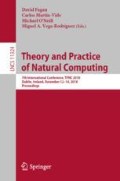Abstract
Disjunct Matrices (DM) are a particular kind of binary matrices which have been especially applied to solve the Non-Adaptive Group Testing (NAGT) problem, where the task is to detect any configuration of t defectives out of a population of N items. Traditionally, the methods used to construct DM leverage on error-correcting codes and other related algebraic techniques. Here, we investigate the use of Evolutionary Algorithms to design DM and two of their generalizations, namely Resolvable Matrices (RM) and Almost Disjunct Matrices (ADM). After discussing the basic encoding used to represent the candidate solutions of our optimization problems, we define three fitness functions, each measuring the deviation of a generic binary matrix from being respectively a DM, an RM or an ADM. Next, we employ Estimation of Distribution Algorithms (EDA), Genetic Algorithms (GA), and Genetic Programming (GP) to optimize these fitness functions. The results show that GP achieves the best performances among the three heuristics, converging to an optimal solution on a wider range of problem instances. Although these results do not match those obtained by other state-of-the-art methods in the literature, we argue that our heuristic approach can generate solutions that are not expressible by currently known algebraic techniques, and sketch some possible ideas to further improve its performance.
Access this chapter
Tax calculation will be finalised at checkout
Purchases are for personal use only
References
Balint, G., et al.: An investigation of \(d\)-separable, \(\bar{d}\)-separable, and \(d\)-disjunct binary matrices. Technical report, San Diego State University (2013). http://www.sci.sdsu.edu/math-reu/2013-2.pdf
Barg, A., Mazumdar, A.: Group testing schemes from codes and designs. IEEE Trans. Inf. Theory 63(11), 7131–7141 (2017)
Belazzougui, D., Gagie, T., Mäkinen, V., Previtali, M.: Fully dynamic De Bruijn graphs. In: Inenaga, S., Sadakane, K., Sakai, T. (eds.) SPIRE 2016. LNCS, vol. 9954, pp. 145–152. Springer, Cham (2016). https://doi.org/10.1007/978-3-319-46049-9_14
Colbourn, C.J., Dinitz, J.H.: Combinatorial designs. In: Handbook of Discrete and Combinatorial Mathematics. CRC Press (1999)
Colbourn, C.J., Ling, A.C.H., Syrotiuk, V.R.: Cover-free families and topology-transparent scheduling for manets. Des. Codes Cryptogr. 32(1–3), 65–95 (2004)
Damaschke, P., Schliep, A.: An optimization problem related to bloom filters with bit patterns. In: Tjoa, A.M., Bellatreche, L., Biffl, S., van Leeuwen, J., Wiedermann, J. (eds.) SOFSEM 2018. LNCS, vol. 10706, pp. 525–538. Springer, Cham (2018). https://doi.org/10.1007/978-3-319-73117-9_37
Du, D., Hwang, F.K., Hwang, F.: Combinatorial Group Testing and Its Applications, vol. 12. World Scientific, Singapore (2000)
Eiben, A.E., Smith, J.E.: Introduction to Evolutionary Computing. Natural Computing Series. Springer, Heidelberg (2015). https://doi.org/10.1007/978-3-662-05094-1
Kautz, W.H., Singleton, R.C.: Nonrandom binary superimposed codes. IEEE Trans. Inf. Theory 10(4), 363–377 (1964)
Larrañaga, P., Karshenas, H., Bielza, C., Santana, R.: A review on probabilistic graphical models in evolutionary computation. J. Heuristics 18(5), 795–819 (2012)
Mariot, L., Leporati, A.: Heuristic search by particle swarm optimization of boolean functions for cryptographic applications. In: Genetic and Evolutionary Computation Conference, GECCO 2015, Madrid, Spain, 11–15 July 2015, Companion Material Proceedings, pp. 1425–1426 (2015)
Mariot, L., Picek, S., Jakobovic, D., Leporati, A.: Evolutionary algorithms for the design of orthogonal latin squares based on cellular automata. In: Proceedings of the Genetic and Evolutionary Computation Conference, GECCO 2017, Berlin, Germany, 15–19 July 2017, pp. 306–313 (2017)
Mariot, L., Picek, S., Jakobovic, D., Leporati, A.: Evolutionary search of binary orthogonal arrays. In: Auger, A., Fonseca, C.M., Lourenço, N., Machado, P., Paquete, L., Whitley, D. (eds.) PPSN 2018. LNCS, vol. 11101, pp. 121–133. Springer, Cham (2018). https://doi.org/10.1007/978-3-319-99253-2_10
Mazumdar, A.: On almost disjunct matrices for group testing. In: Chao, K.-M., Hsu, T., Lee, D.-T. (eds.) ISAAC 2012. LNCS, vol. 7676, pp. 649–658. Springer, Heidelberg (2012). https://doi.org/10.1007/978-3-642-35261-4_67
Mühlenbein, H.: The equation for response to selection and its use for prediction. Evol. Comput. 5(3), 303–346 (1997). https://doi.org/10.1162/evco.1997.5.3.303
Mühlenbein, H., Paaß, G.: From recombination of genes to the estimation of distributions I. Binary parameters. In: Voigt, H.-M., Ebeling, W., Rechenberg, I., Schwefel, H.-P. (eds.) PPSN 1996. LNCS, vol. 1141, pp. 178–187. Springer, Heidelberg (1996). https://doi.org/10.1007/3-540-61723-X_982
Pearl, J.: Causality: Models, Reasoning and Inference. Cambridge University Press, New York (2000)
Poli, R., Langdon, W.B., McPhee, N.F.: A field guide to genetic programming (2008). http://lulu.com, http://www.gp-field-guide.org.uk. (With contributions by J. R. Koza)
Porat, E., Rothschild, A.: Explicit nonadaptive combinatorial group testing schemes. IEEE Trans. Inf. Theory 57(12), 7982–7989 (2011)
Safadi, R., Wang, R.: The use of genetic algorithms in the construction of mixed multilevel orthogonal arrays. Technical report, OLIN CORP CHESHIRE CT OLIN RESEARCH CENTER (1992)
Stinson, D.R., Van Trung, T., Wei, R.: Secure frameproof codes, key distribution patterns, group testing algorithms and related structures. J. Stat. Plan. Inference 86(2), 595–617 (2000)
Stinson, D.R., Wei, R.: Generalized cover-free families. Discret. Math. 279(1–3), 463–477 (2004)
Acknowledgments
Parts of our work have been inspired by COST Action CA15140 supported by COST (European Cooperation in Science and Technology).
Author information
Authors and Affiliations
Corresponding author
Editor information
Editors and Affiliations
Rights and permissions
Copyright information
© 2018 Springer Nature Switzerland AG
About this paper
Cite this paper
Knezevic, K., Picek, S., Mariot, L., Jakobovic, D., Leporati, A. (2018). The Design of (Almost) Disjunct Matrices by Evolutionary Algorithms. In: Fagan, D., Martín-Vide, C., O'Neill, M., Vega-Rodríguez, M.A. (eds) Theory and Practice of Natural Computing. TPNC 2018. Lecture Notes in Computer Science(), vol 11324. Springer, Cham. https://doi.org/10.1007/978-3-030-04070-3_12
Download citation
DOI: https://doi.org/10.1007/978-3-030-04070-3_12
Published:
Publisher Name: Springer, Cham
Print ISBN: 978-3-030-04069-7
Online ISBN: 978-3-030-04070-3
eBook Packages: Computer ScienceComputer Science (R0)

